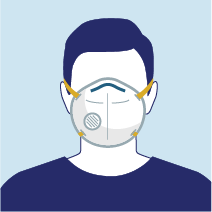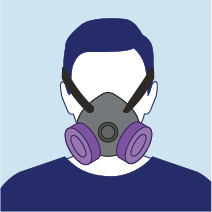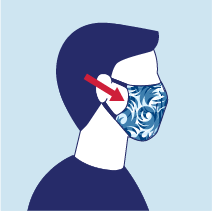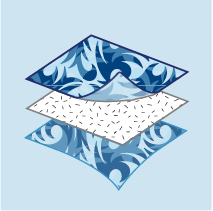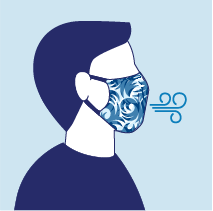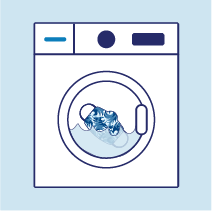Use of Respirators, Facemasks, and Cloth Face Coverings in the Food and Agriculture Sector During Coronavirus Disease (COVID-19) Pandemic
<< Food Safety and the Coronavirus Disease 2019 (COVID-19)
The Centers for Disease Control and Prevention (CDC) advise the use of simple cloth face coverings to slow the spread of the virus and to help people who are unaware they have the virus from spreading it to others. This has led to questions from the Food and Agriculture Sector about what respirators, disposable facemasks, such as surgical or medical masks, or cloth face coverings are most appropriate for various settings. This fact sheet, developed in collaboration with CDC, provides a quick reference to these items potentially worn by workers in the Food and Agriculture Sector. Respirators, disposable facemasks, or cloth face coverings are designed and worn for different purposes as described in the table below.
If, prior to the COVID-19 pandemic, you were required to wear a respirator or disposable facemask on the job, based on a workplace hazard assessment, you should continue to do so.
Respirators, Disposable Facemasks, and Cloth Face Coverings
Respirators
N95 Respirator
Elastomeric Respirator
- Respirators protect wearers from breathing in hazardous contaminants in the air.
- Respirators are required equipment for workers performing some jobs in the Food and Agriculture Sector.
- If you are required to use a respirator for your job, you should continue to do so.
Disposable Facemasks
- Disposable facemasks, such as surgical or medical masks, are not respirators and do not protect the wearer from breathing in small particles, gases, or chemicals in the air.
- Disposable facemasks act as a protective barrier to prevent splashes, sprays, large droplets, or splatter from entering the wearer’s mouth and nose. The protective quality of disposable facemasks varies depending on type of material used to make the facemask.
- Disposable facemasks also help prevent the wearer from spreading respiratory droplets.
- Because disposable facemasks help prevent the wearer from spreading respiratory droplets, they may slow the spread of the virus that causes COVID-19. Wearing them may help people who unknowingly have the virus from spreading it to others.
Cloth Face Coverings
- Cloth face coverings, whether provided by the employer or brought from home by the worker, are not respirators or disposable facemasks and do not protect the worker wearing them from exposures.
- Cloth face coverings are only intended to help contain the wearer’s respiratory droplets from being spread.
- Used in this way, CDC has recommended cloth face coverings to slow the spread of the virus that causes COVID-19. Wearing them may help people who unknowingly have the virus from spreading it to others.
- Workers can wear a cloth face covering if the employer has determined that a respirator or a disposable facemask is NOT required based on the workplace hazard assessment.
- When it is not practicable for workers to wear a single cloth face covering for the full duration of a work shift, particularly if they become wet, soiled, or otherwise visibly contaminated, a clean cloth face covering (or disposable facemask option) should be used and changed out as needed.
- Review information provided on how to wear and care for cloth face coverings.
Considerations for Use of Cloth Face Coverings
Consider the following if you choose to wear a cloth face covering to slow the spread of COVID-19:
Proper wear and care of a cloth face covering
-
Maintain face coverings in accordance with parameters in FDA’s Model Food Code sections 4-801.11 Clean Linens and 4.802.11 Specifications, as applicable.
-
Launder reusable face coverings before each daily use.
Cloth face coverings should:
Cover the nose and below the chin
Fit snuggly but comfortably against the side of the face
Be secured with ties or ear loops
Include multiple layers of fabric
Allow for breathing without restriction
Be able to be laundered and machine dried without damage or change in shape
IMPORTANT: Hand hygiene is an important infection prevention and control measure. Wash your hands with soap and water for at least 20 seconds after putting on, touching, or removing respirators, masks, or cloth face coverings.
The use of cloth face coverings in the work environment should be used in addition to other control measures, including engineering controls such as implementing social distance practices and physical partitions or barriers; and administrative controls such as frequent cleaning and disinfection protocols.
If you have symptoms and feel sick, stay home.
For more information see CDC’s Use of Cloth Face Coverings to Help Slow the Spread of COVID-19.
Additional Information:
If you are managing a farm, facility, or establishment and need assistance finding suppliers of PPE or face coverings, please contact FEMA at NBEOC@max.gov.
To learn more about the regulation applicable to face masks, see: Enforcement Policy for Face Masks and Respirators During the Coronavirus Disease (COVID-19) Public Health Emergency (Revised) - Guidance for Industry and Food and Drug Administration Staff April 2020.

